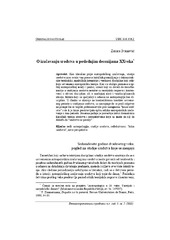Приказ основних података о документу
O izučavanju srodstva u poslednjim decenijama XX veka
On kinship studies in the final decades of the 20th century
| dc.creator | Ivanović, Zorica | |
| dc.date.accessioned | 2021-10-12T10:48:44Z | |
| dc.date.available | 2021-10-12T10:48:44Z | |
| dc.date.issued | 2008 | |
| dc.identifier.issn | 0353-1589 | |
| dc.identifier.uri | http://reff.f.bg.ac.rs/handle/123456789/736 | |
| dc.description.abstract | Kao klasično polje antropološkog izučavanja, studije srodstva nisu ostale van procesa kritičkih promišljanja i dekonstrukcije teorijskih i analitičkih kategorija i vrednosti discipline koji odlikuju savremenu antropološku teoriju. Kao i u slučaju promena u opštoj antropološkoj teoriji i praksi, uzroci koji su doveli do transformacija u studijama srodstva rezultat su teorijskih rasprava i kontroverzi u okviru discipline, ali u značajnoj meri i vandisciplinarnih uticaja, faktora koji su spoljašnji u odnosu na antropologiju kao disciplinu. U članku se ukazuje na kontradiktoran karakter savremenog perioda u studijama srodstva, uz nastojanje da se pruži odgovor na pitanje šta se uopšte podrazumevalo pod sintagmom 'kriza srodstva' i da li je kriza predstavljala opštu odliku antropoloških izučavanja u tom periodu. Posebna pažnja je posvećuje kritici formalizma klasičnih teorija srodstva i perspektivama koje su imale za cilj da dokažu da 'srodstvo ne postoji'. . | sr |
| dc.description.abstract | As a classical field of anthropological studies, gender studies have not remained outside the process of critical considerations and deconstruction of theoretical and analytical categories and the values of the discipline which characterizes the contemporary anthropological theory. As in the case of changes in the general theory and practice of anthropology, the reasons which have led to a transformation in the gender studies, are the result of theoretical arguments and controversies within the discipline, but to a significant degree, from outsider influences as well - the factors which are exterior in relation to the anthropology as a discipline. The contradictory character of the contemporary period in gender studies is being emphasized, with an effort to give the answer to the question what did the phrase 'gender crisis' denote and whether the crisis signifies a broad trait of anthropological studies at that point in time. The article pays particular attention to the analysis of the criticism of the theoretical and methodological formalism of the classic kinship theories and to the perspectives aimed to prove that 'kinship does not exist'. . | en |
| dc.publisher | Univerzitet u Beogradu - Filozofski fakultet - Odeljenje za etnologiju i antropologiju, Beograd | |
| dc.relation | info:eu-repo/grantAgreement/MESTD/MPN2006-2010/147037/RS// | |
| dc.rights | openAccess | |
| dc.rights.uri | https://creativecommons.org/licenses/by/4.0/ | |
| dc.source | Etnoantropološki problemi | |
| dc.subject | studije srodstva | sr |
| dc.subject | refleksivnost | sr |
| dc.subject | nove perspektive | sr |
| dc.subject | 'kriza srodstva' | sr |
| dc.subject | antropologija | sr |
| dc.subject | reflexivity | en |
| dc.subject | new perspectives | en |
| dc.subject | kinship studies | en |
| dc.subject | 'kinship crisis' | en |
| dc.subject | anthropology | en |
| dc.title | O izučavanju srodstva u poslednjim decenijama XX veka | sr |
| dc.title | On kinship studies in the final decades of the 20th century | en |
| dc.type | article | |
| dc.rights.license | BY | |
| dc.citation.epage | 138 | |
| dc.citation.issue | 2 | |
| dc.citation.other | 3(2): 107-138 | |
| dc.citation.spage | 107 | |
| dc.citation.volume | 3 | |
| dc.identifier.fulltext | http://reff.f.bg.ac.rs/bitstream/id/2265/733.pdf | |
| dc.identifier.rcub | https://hdl.handle.net/21.15107/rcub_reff_736 | |
| dc.type.version | publishedVersion |

